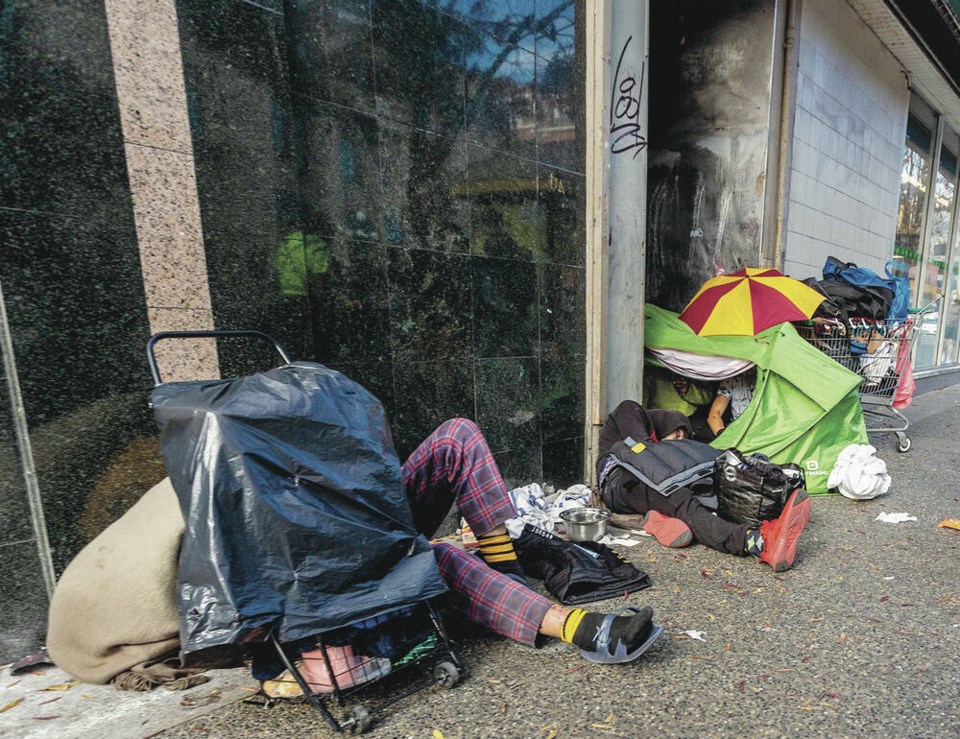If widespread “frustration, desperation and fear” across B.C. are enough to focus governments’ attention on a problem, the Save Our Streets got off to a good start on Monday.
It’s a disparate coalition of companies and agencies brought together by two beliefs.
One: Public disorder, homelessness and addiction issues have grown so bad that B.C. is in distress.
Two: the federal, provincial and municipal governments are collectively either failing to respond, or responding with measures that aren’t working.
So 31 businesses and citizen groups have banded together under the theme “enough is enough” to push the overall public disorder issue a lot higher up on the government’s agenda than it is now.
Premier David Eby welcomed the group’s arrival and said he is open to any new ideas.
But the thrust of his response illustrates some of the very problems that SOS is “sick and tired of,” according to London Drugs president Clint Mahlman. He helped form the group due to severe shoplifting and violence in and around some of the firm’s stores.
Eby cited a number of moves the NDP has made since a coalition of mayors goaded the government to take some action 18 months ago.
Some 300 repeat offenders are being monitored and supported to get out of the catch and release cycle. More mental-health workers have been hired and millions have been spent on supportive housing.
B.C. also led a push to get the federal government to change bail conditions for violent offenders. That’s a good response to SOS concerns, but it’s also currently a good example of failure.
The federal reforms were late in coming and are now tied up in the Senate.
Eby on Monday segued from violent offenders to the need for Senate reform, or even abolition. That’s a time-consuming rat hole that swallows up all hope of immediate action on making people feel safer.
Mahlman said: “Governments at all levels have responded in piecemeal fashion but are not acting in unison or with any sense of urgency…
“The current approach is not working. We hear from politicians all the time that they share our concerns, but we’re well past the point that words don’t mean much.
“We want to see measurable results.”
The coalition has a multi-stage strategic plan to make crime and violence a major issue in upcoming federal and provincial election campaigns.
Karen Kuwica, of the Nanaimo Area Public Safety Association, said that city was forever changed after one of the largest tent cities in Canada developed five years ago. Violent repeat offenders live in the community rather than in care as the opioid and housing affordability crises worsen. It amounts to a public safety emergency, she said.
She called for a “reformed social policy that restores civil society, rather than doubling down on what we already know is failing.”
Tanya Finley, a restaurant owner in Nelson and member of a neighbourhood network, said that community’s beautiful downtown is now a centre of homelessness, crime and addiction.
“I feel I’m watching a government-assisted slow suicide of people they are claiming to help.”
Reviving people multiple times a day and leaving them on cold winter streets “is not dignified. It’s cruel and disgraceful.”
She said the Kootenays are being swallowed by pilot projects, band aids and mismanagement.
People are afraid of shelters or overdose prevention sites because there are no guardrails.
“Saving lives and complete chaos do not go hand in hand. Compassion and love come with rules, boundaries and understood expectations, then consequences when needed.”
SOS is going to have a hard time maintaining its stated “non-partisan” stance on such a politically charged issue. The speakers’ perceptions of street crime were presented in the starkest, most extreme fashion.
But there’s one aspect where SOS might find some common ground.
It’s on the need for measurable results and statistical evidence showing whether the current approach is making streets safer. It wants constant independent monitoring of all levels of governments’ actions to determine what is working.
Seven years into the official public health emergency declared about the opioid crisis, it’s remarkable how it’s just a routine fact of modern life now.
SOS is aiming to rekindle some outrage about how bad the overall situation has become.
>>> To comment on this article, write a letter to the editor: [email protected]



